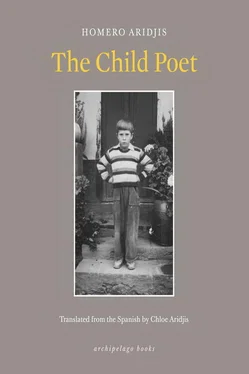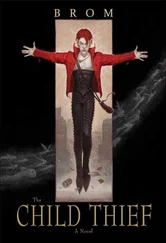Occasionally a hare or an armadillo was caught in the headlights. But in the back, with no light, we couldn’t even see one another, and the loneliness of the night burrowed into our souls.
Weariness, hunger, and dust had taken command of our bodies, and made me long for my well-lit room.
Finally, at midnight, a few dogs began barking in the distance; shortly afterwards, we arrived at a house.
A peasant around forty years old appeared with a flashlight to receive the priest, who was captain of our team, bidding us all to enter.
In the kitchen he served us each hot soup and a slice of brown bread, which the priest ordered us to eat quickly because we had to rise early for the Mass he was going to say at the chapel next door.
While we ate our soup, Ricardo el Negro clutched his spoon in his hand and spoke incessantly, until our time at the table ran out and the priest, picking up his plate, left him still hungry.
Before he went to bed, Ricardo el Negro, his face lit by a candle, told Juan how I had cried because the priest had kept me as a reserve during both halves of the game.
Lying on a plank resting on two pillars of bricks, with a blanket that covered only half my body, I spent the night shivering and afraid that any movement I made would topple the bed.
The priest, lying on a plank like mine, blessed me to the howling of the dogs and blew out the candle flame.
*In Spanish “juego de los encantados,” game of the enchanted. When tagged, one is “encantado,” or under a spell.
ONE MIDDAY IN JUNE, three tall, broad, mustached men with no suitcases alit from the van that came from the train station.
From the stop they headed towards the Town Hall and disappeared behind a door that closed after them.
They reappeared on Rayón Street and followed each other into the La Barca de Oro cantina. One minute later we heard gunshots.
Later on, don Pedro came to the store, followed by Juan.
“The Norteño,” he said, “killed a secret agent and tried to run away. But another agent, with a.45 in each hand, shot him in the legs.”
“Yeah,” Juan added. “When the Norteño lay wounded on the ground the agent came closer to finish him off, but he spotted doña Blanca looking at him from her window and he didn’t go through with it. He only aimed at his mouth, to scare him. Doña Blanca heard him say, “I won’t kill you yet, just wait.” Then the other agent came over and asked his buddy, “What should we do with him?” “Leave him to me for a while,” the first one replied, sealing the Norteño’s fate with a look as he almost bled to death on the stones.
“He made a mistake,” said don Pedro. “He thought the agents were coming to get him, but they were only going around disarming people. And the dead man showed him his police badge when he came into the cantina. And the Norteño, who had a couple of murders to his name in Sonora, thought they were going to arrest him; so he leaned over as if to let them frisk him and shot the agent in the heart from beneath his jacket. As the shots hit him the deceased emptied his gun into the floor, but the Norteño had already broken into a run. It was then that the other two agents outside fired at him.”
That night, they treated the Norteño in a room in the jail, grudgingly and without anesthesia, so he would die. And they hung him by his arms and beat him with sticks so he would die. But he refused to die.
The next day soldiers arrived from Morelia. The villagers were curious about the agents, who were scared the local people might kill them.
But when the soldiers moved in, it was the people of Contepec who were afraid, since they pointed their rifles at every man, woman, old person, or child who went near them. And from the window of a troop truck a mocking sergeant brandished his machine gun.
So when the soldiers carried off the Norteño and the dead agent, people calmed down. Yet they never paid the carpenter who made the coffin. “Let the village pay,” a corporal who’d stayed on to keep an eye on things told him.
The Norteño didn’t hail from Contepec. In Mexico City he’d become the boyfriend of the baker’s daughter and one day he came to town with her. He opened a cantina, which he would only leave to go home to sleep, and spent customerless afternoons throwing dice. He had a particular dislike for Tequilitas, who used to come in drunk to talk to him.
“Get out,” he’d say. “I prefer to be alone, like a vulture. All alone in my business.”
The new cacique followed the corporal around, anxious to please. The corporal treated him like a subordinate. And not just a subordinate, but one he scorned. Whenever he mentioned him his mouth twisted, as if he were throwing the words at his listeners or spitting out the cacique.
Sitting between two soldiers on a bench in the square, the corporal would pull out his pistol and with his slanty eyes gleaming maliciously take aim at the cross atop the church tower.
“Let’s see if I can hit it,” he’d say.
He limped when he walked, and his right shoe looked flattened, as if it were hollow with no foot inside.
There was a yellow dog, very fierce, who followed him everywhere as if he were his master.
This dog, who growled at everybody, attacked me and Juan one July night, chasing us up a tree, where we remained on a branch for more than half an hour. Finally I slid down and when I saw the dog coming at me I picked up a stone and threw it at him, hitting his head.
The dog began to run in circles, biting the air, as if he’d gone mad.
That morning the corporal went to the market with his soldiers. He sauntered past the stands as though he owned them. He probed and picked up the fruit, and everything from oranges to melons, peanuts to pineapples, mameys to watermelons, dropped into his bag, unpaid for, while the fruit sellers totted up with their eyes what he took from them.
Afterwards he came to the shop and from the threshold asked, “Who does the selling here?”
My father replied, “I do. What do you need?”
“Everything.”
“Everything of what?”
“What’s in the store.”
“If you buy it.”
He looked at the shelves. He looked at my father. His slanted eyes shone with that gleam that precedes laughter. And then he saw me.
“I know this kid,” he said. “He threw a stone at my dog’s head. He left him an idiot … Let’s see …” He turned towards my father. “Give me a shirt, one of the fancy ones. I’m going to give it to my brother when I leave.”
He chose one. And paid only five pesos for it. He asked that it be gift- wrapped. And he walked out of the store, followed by his soldiers.
The corporal’s dog died.
The next day I saw him lying by the bandstand in the square.
At first, from the distance, I thought he was sleeping, but when I walked past later on I realized he was dead.
A policeman dragged him over the cobblestones to throw him to the vultures.
The corporal didn’t seem to feel sorry or even remember that the dog used to always follow him. When he ran into the policeman and saw the dog on the cobblestones his expression didn’t change, and he only seemed annoyed that the policeman wasn’t dragging him fast enough to the outskirts of the village.
Standing in the street, he screwed up his mouth pensively as if about to make a decision, but looked towards the mountain — its blues, its shadows, the sunlit peak, the rocky ravine — as if that moment in time were tearing him out of time, taking him far from the village, from the policeman, from the dog. Yet suddenly his expression lost its calm, and serenity vanished from his face like a fleeting cloud. He turned back to the soldiers and yelled, “Get moving, you lazy bums.”
Читать дальше












